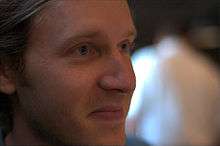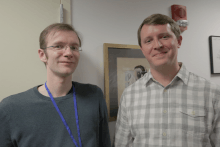William John Sullivan
William John Sullivan (more commonly known as John Sullivan[2]) (born December 6, 1976) is a software freedom activist, hacker, and writer. John is currently executive director[3] of the Free Software Foundation, where he has worked since early 2003. He is also a speaker and webmaster for the GNU Project. He also maintains the Plannermode and delicious-el packages for the GNU Emacs text editor.
John Sullivan | |
|---|---|
 Sullivan at Free Software Foundation event, June 2006. | |
| Born | December 6, 1976 |
| Employer | Free Software Foundation[1] |
Active in both the free software and free culture communities, Sullivan has a BA in philosophy from Michigan State University and an MFA in Writing and Poetics. In college, Sullivan was a successful policy debater, reaching finals of CEDA Nationals and the semifinals of the National Debate Tournament.[4]
Until 2007, John was the main contact behind the Defective by Design, BadVista and Play Ogg campaigns. He also served as the chief-webmaster for the GNU Project, until July 2006.[5]
He has served as Executive Director of the Free Software Foundation since 2011.
As a speaker for the GNU Project

John currently delivers speeches on the following topics,[6] in English:
- Digital Rights Management[7] issues and the FSF's Defective by Design campaign
- Media format patents, proprietary licensing, and the FSF's PlayOgg.org campaign
- Choosing free software over Microsoft Windows
- How you can help: Strategies for communicating and organizing around free software ideals
- Why software should be free
- Introduction to the GPLv3 and free software licensing
- FSF/GNU high-priority free software projects[8]
References
- Contacting the Free Software Foundation
- John Sullivan's home page
- FSF announces new executive director
- "NDT Results 1997-2005" (PDF). American Forensic Association. Retrieved 9 March 2011.
- GNU's Webmasters - GNU Project - Free Software Foundation (FSF)
- GNU and Free Software Speakers - GNU Project - Free Software Foundation (FSF)
- Confusing Words and Phrases that are Worth Avoiding - GNU Project - Free Software Foundation (FSF)
- High Priority Free Software Projects - Free Software Foundation Archived 2007-08-10 at the Wayback Machine